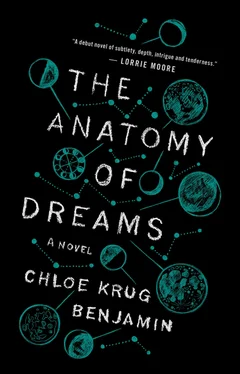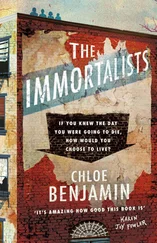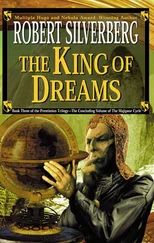“Hall monitor noticed two of you buggers were missing,” said Sandy, eyeing the rearview mirror and pulling onto the road with a lurch. “We checked the phone in the girls’ dorm—knew you wouldn’t be the one to call, Lennox—and what do you know, five missed calls. Number traced right to the airport.”
“Five?” Gabe looked at me, grinning.
“Well . . .” I said in protest.
“Anyway,” said Sandy, “no harm done. Just a little excitement on a Sunday night. I should be used to it by now.”
With Sandy in the car, Gabe and I went mute again, staring out of our respective windows. But there was a presence between us, a fullness, and the molecules in the van seemed to shift to accommodate it. The drive to campus was only twenty minutes long, but it felt like hours. At one point, Gabe shifted his large boy-foot, and his calf—warm, hairy—rubbed against mine. I shivered, and his calf muscle tensed. But then the shiver passed, and his leg relaxed, and we stayed that way: linked by the barest touch as we wound toward school, stars winking in the windows.
When I woke up in my top bunk the next morning, Hannah snoring vigorously below me, the previous night felt like a dream. But when I saw Gabe across the dining hall at breakfast, sitting at a round table with David Horikawa and Michael Fritz, he stuck his arm in the air and motioned me over with the exaggerated enthusiasm of an air traffic controller.
“Yo!” he called. “Patterson!”
A few of the other seniors craned their heads around in surprise—Hannah and I usually sat with the girls on our hall—but I grabbed Hannah by the wrist and walked over, feigning confidence. Teenagers have a nose for insecurity, which is probably why we so often pardoned Gabe: everything he did had a robust aplomb that sent us sniffing elsewhere.
“Patterson and I had a little adventure last night,” said Gabe as Hannah and I took our seats. (“ What the —” asked Hannah, who had heard none of this, before I jabbed her thigh under the table.) Soon, the five of us were eating breakfast together almost every day. By the end of September, Hannah had entered into a passionate, ill-fated liaison with David Horikawa, but Gabe and I still hadn’t kissed. We’d had plenty of opportunities—late-night meet-ups in the multipurpose room; riding cafeteria trays down Observatory Hill, Gabe and I crashing at the bottom in a tangle of legs and plastic—but whenever the laughter stopped, we could only stare at each other, red-faced.
“You guys hang out all the time. I just don’t get what you’re doing ,” said Hannah. Blotchy, blackberry-colored hickeys had started to appear on her body in surprising places (collarbone, inner elbow, and once, she showed me, smiling wickedly, her inner thigh); she was baffled by our restraint, not that it was intentional.
“We’re talking ,” I said helplessly, and it was true: we’d become expert in the kind of simpatico conversation that usually only fell into place after years of friendship. Tucked between the redwood trees in the forest behind school, we traded stories: our secret plans (“To be a physicist,” I whispered, hot-cheeked), our childhood fears (“Pill bugs,” said Gabe), our families. What I’d heard of Gabe’s was partially true: he lived with his mother in Tracy, California, a humid town in the San Joaquin Valley—“best known,” said Gabe, “as the place where people stop to pee on the way to Tahoe.” His mother worked from home for a telecommunications company and was heavily medicated for a chronic pain condition that made her yell, he said, or sleep. His dad wasn’t dead, but he “wasn’t in the picture”—a phrase Gabe said with such swift automatism that it sounded like something he’d been trained to say.
I didn’t push him. Instead, I told him about my family. We were closer, maybe, but not cuddly. My parents prized their intellects and encouraged the same in my brother, Rodney, and me. Rodney was five years younger, thirteen during my senior year, and he was the softest one of all of us: a boy unusually gentle for thirteen, who kept a pet newt and wrote short stories on my father’s hand-me-down laptop. They lived in New Jersey, ten states and six hours away, and most of the time I kept them tucked in one compartment in my mind—a compartment I opened up when I went home but otherwise kept firmly lidded.
A narrow channel had opened between Gabe and me, and we wriggled through. What we had was a likeness, an understanding of the way that solitary people could and had to drift together. Though Gabe was often surrounded by a troop of boys, he was more reclusive than most people knew. He took long, tangled walks alone on weekends, returning to the dorms with dirty fingernails and forearms scratched by brambles. He did his homework in the attic of the library, a tower that one of the headmasters in the 1960s had dubbed a place for silent thought—Gabe claimed he couldn’t think if anyone else was around. Having spent most of the past three years at Mills (“It’s like this weird alternate universe,” he said, “where everyone is sixteen”), we were both independent by design, expert in adopting friends and in letting them go. As solid as Mills felt while we were there, we knew we would have to relinquish it at the end of senior year, just as we had our real families. Against our better judgment, in defiance of our transience and the rush of time, we built a raft and clung to it.
When I was with him, I longed to kiss him, but I was starting to despair. (“We couldn’t do it now ,” I said to Hannah, rolling around in my bunk. “We’re already friends. It’d be too weird.”) On Halloween, Hannah—sick of my whining and already to third base with David Horikawa—came into our room armed with a trough of makeup and a minidress purchased at the thrift store in Eureka.
“Tonight is the night,” she said. “Women’s intuition.”
She was right. In the middle of the annual Halloween party—a teacher-patrolled affair in the multipurpose room, with an epic snack table to offset the booze we seniors snuck into the punch—Gabe pulled me into the boys’ bathroom and took my face in his hands. He was a hamburger with pool-noodle fries, I a Roy Lichtenstein comic girl. We kissed pressed against the stalls until one of the resident advisers came in to pee, his eyes bulging; then we ran, hysterical with adrenaline, our hands clasped tight as sailor’s knots. We took the fire escape to the first floor and burst outside. It was raining faintly; above us, the windows of the multipurpose room had been pushed open to release the collective heat and Cheez-It breath of two hundred teenage bodies. Their voices floated out to us, free and high-pitched as loose balloons.
“So,” said Gabe.
“So.”
I could barely get the word out. I felt like I’d swallowed my tongue.
Something—not love but its precursor, a love embryo—loomed between us. I moved toward him again, and this time our kiss was tentative, investigative. We covered more ground, moving from mouth to ear to edge of cheek as if to memorize the topography of each other’s faces. That night, we fell asleep outside, and though we got in trouble for it later—Sandy glowering as he lumbered toward us through the trees, his red ponytail slapping his back—I still remember the first few moments of that morning: the sun blushing over the hills as the sparrows trilled the day’s first song, their notes soaring through the air like streamers.
I couldn’t believe we’d done it—that one of the most beloved boys in our class had kissed my cheeks and chin and eyelashes until the red dots that Hannah had so painstakingly applied (bent over our art history textbook, lip liner in hand) smeared my whole face blurry. If Gabe was a pit bull, I had the pert, close features of a dachshund: quick brown eyes, small pursed mouth. A snub of nose, a dash of freckles. It was a utilitarian face: focused, unobtrusive, fine to look at but nothing that would make most people look twice. I was as lean and agile as Rodney, even at sixteen; I kept my chestnut hair in a taut little ponytail, my widow’s peak a dark point. Sometimes I envied girls with voluptuous features—plump lips, lush movie-star hair—but just as often I was grateful for my inconspicuousness. There’s nothing more dangerous than a teenager who looks like a librarian, because we can get away with anything. On the day of the Halloween party, a group of us snuck out to the closest corner store that sold alcohol, and I was the one who purchased it. I was never ID’d; I looked so plain, so earnest, that the paunched owner gave me the benefit of the doubt. That Gabe wanted me was just as thrilling as buying a bottle of whiskey at the age of eighteen: both meant, somehow, that I had passed.
Читать дальше












